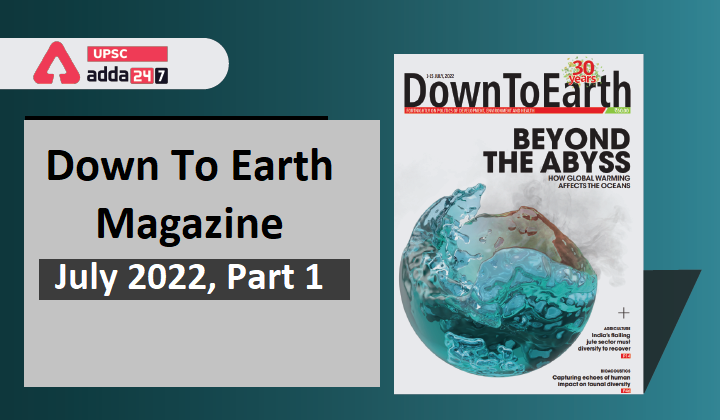Table of Contents
Down To Earth Magazine is a fortnightly magazine focusing on politics of environment and development, published in New Delhi, India.
UPSC Previous years’ questions on Development, Environment, Health and Disaster Management give us a clear idea about the increased importance of DTE Magazine.
DTE Magazine is one of the most important and indispensable source for UPSC Civil Services Exam Preparation. Keeping this in mind, here, we come with ”Gist Of Down To Earth Magazine” which covers important environmental current affairs articles in smooth pointed form, keeping in mind the demand of UPSC aspirants.
India at WTO’s 12th Ministerial Conference: Why in the News?
The WTO’s 12th Ministerial Conference was held in Geneva from 12-17 June. It was supposed to end on 15 June, but with intensifying negotiations, the conference was extended by two days.
India at WTO’s 12th Ministerial Conference: What is the WTO?
- The World Trade Organization is the only international organization that deals with the rules of trade between countries.
- Founded in 1995, the WTO is run by its 164 members, and according to its rules, all decisions are taken through consensus and any member can exercise a veto.
- Its aim is to promote free trade, which is done through trade agreements that are discussed and signed by the member states.
- The WTO also provides a forum for countries to negotiate trade rules and settle economic disputes between them.
India at WTO’s 12th Ministerial Conference: What is WTO’s Ministerial Conference?
- The Ministerial Conference is the WTO’s top decision-making body and usually meets every two years.
- All members of the WTO are involved in the MC and they can take decisions on all matters covered under any multilateral trade agreements.
India at WTO’s 12th Ministerial Conference: What Happened at the Conference?
- On June 17, member countries of the WTO wrapped up the Ministerial Conference securing agreements on relaxing patent regulations to achieve global vaccine equity; ensuring food security, according to subsidies to the fisheries sector and continuing moratoriums relevant to e-commerce, among others.
- Negotiators could not reach agreements on issues such as permissible public stockholding threshold for domestic food security, domestic support to agriculture, cotton, and market access.
- Within the next six months, members are expected to decide on increasing the scope of the agreement to cover the production and supply of COVID-19 diagnostics and therapeutics as well.
India at WTO’s 12th Ministerial Conference: What Did India Seek?
- India and South Africa and other developing countries have sought a waiver of intellectual property rights for COVID-19 vaccines, treatments and diagnostics for over a year, but faced opposition from several developed nations with major pharmaceutical producers.
- India wanted to commence negotiations on therapeutics and diagnostics but it could not happen during the conference.
- India and South Africa had sought to preserve policy space for the digital advancement of developing countries by letting them generate more revenues from customs and thereby facilitate more investment.
- India and South Africa had initially opposed an extension to E Commerce Moratorium, saying they should not be missing out on customs revenues but the extension runs to the next ministerial conference.
India at WTO’s 12th Ministerial Conference: What Did India Achieve?
- A critical waiver of WTO’s Agreement on Trade-Related Aspects of Intellectual Property Rights or trips, a key demand of India along with South Africa and a host of other developing countries, almost at the bottom.
- India successfully managed to carve out an agreement on eliminating subsidies to those engaged in illegal, unreported and unregulated fishing.
- Checks are being placed on illegal fishing in the high seas and our fishermen will have full freedom in our EEZ (Exclusive Economic Zones).
- India is still able to safeguard its food security requirements, it is only due to the peace clause the Group of 33 developing countries was able to wrest at Bali in 2013. So, we have ensured the MSP (Minimum Support Price) stays and our farmers interests have been protected.
- Further, the MSP operations for farmers are also protected and “farmers will not have any problem
India at WTO’s 12th Ministerial Conference: WTO is a rough place for developing countries?
- WTO is a rough place for developing countries because here arm-twisting is the practised sport of powerful nations and blocs. Goyal should know this by now.
- If India is still able to safeguard its food security requirements, it is because of its proactiveness during the conference and the peace clause that the Group of 33 developing countries was able to wrest at Bali in 2013.
- It still protects India from being challenged at WTO
India at WTO’s 12th Ministerial Conference: WTO Members Seek Reform
- All WTO members say the organisation’s rule book needs updating, although they disagree on what changes are required.
- Most pressingly, its dispute appeals court has been paralysed for nearly two years since then-U.S. president Donald Trump blocked new adjudicator appointments, which has curbed the WTO’s ability to resolve trade disputes.
- Members committed to work towards necessary reforms of the WTO to improve its functions. This work should be transparent and address the interests of all members, including developing countries, which are afforded special treatment.
- The WTO committed to conduct discussions so as to have a fully functioning dispute settlement system by 2024.
- The declaration highlighted the growing importance of services trade and the need to increase the participation of developing countries.
- The members also recognised global environmental challenges including climate change and related natural disasters, loss of biodiversity and pollution. Some experts believe issues about the environment have the potential to give the body a new vitality and purpose.



 TSPSC Group 1 Question Paper 2024, Downl...
TSPSC Group 1 Question Paper 2024, Downl...
 TSPSC Group 1 Answer key 2024 Out, Downl...
TSPSC Group 1 Answer key 2024 Out, Downl...
 UPSC Prelims 2024 Question Paper, Downlo...
UPSC Prelims 2024 Question Paper, Downlo...





